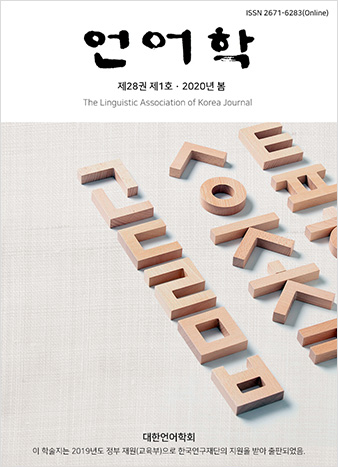대한언어학회 전자저널

28권 1호 (2020년 3월)
- Resegmentation of Tense-Aspect Markers in Jejueo, the Traditional Language of Jeju Island
-
Sejung Yang
Pages : 65-78
Abstract
Yang, Sejung. (2020). Resegmentation of tense-aspect markers in Jejueo, the traditional language of Jeju island. The Linguistic Association of Korea Journal, 28(1), 65-78. Jejueo pedagogical materials reflect previous mis-analyses of the languages verbal morphology. The current study attempts to identify those errors and to offer a corrective reanalysis. Problems with traditional proposals are traced to the influence of an over-reliance on syllable structure in the use of Hangeul to spell Jejueo as well as to a disregard for phonological phenomena resulting in the mis-segmentation of verbal suffixes. The current analysis takes account of common phonological phenomena in Jejueo: re-syllabification and allomorphic variation after s (ㅅ). The proposed tense and aspectual markers are the perfective marker eos (엇), the continuative marker eoms (어ᇝ), the non-past markers eun (은) and neun (는), and the past tense marker eon (-언). This new view of morpheme segmentation enables us to better identify the intricate system of the verbal morphology in Jejueo while providing a basis for identifying other suffixal forms with which they combine.
Keywords
# Jejueo # tense-aspect markers # segmentation # re-syllabification # orthography
References
- Bybee, J. L. (1985). Morphology: a study of the relation between meaning and form. Amsterdam: Benjamins.
- Cinque, G. (2014). Again on tense, aspect, mood morpheme order and the ‘mirror principle’. Functional structure from top to toe: The cartography of syntactic structures, 9, 232-265.
- Fasold, R. (1984). The sociolinguistics of society. Oxford: Basil Blackwell.
- Ferguson, C. (1968). Language development. In Fishman, J., C. Ferguson & J. Da Gupta (Eds.), Language problems of developing nations (pp. 27-35). London: John Wiley.
- Greenberg, J. (1966). Language universals. The Hague & Paris: Mouton.
- Helmbrecht, J. (2004). Cross-linguistic generalizations and their explanation. In C. Lehmann, J. Mugdan, S. Skopeteas, W. Kesselheim, & G. E. Booij (Eds.), Morphology 2: An international handbook on inflection and word-formation (pp. 1247-1255). Berlin: De Gruyter.
- Hyun, P.-h. (1962). Jejudo bangeon yeongu: Je 1 jib jalyopyeon (‘A study of Cheju Island dialect: Data, volume 1’). Seoul: Jeongyeon-sa.
- Hyun, P.-h. (1976). Jejueo bangeon-ui jeongdongsa eomi yeongu (‘A study of finite verbal endings in the Cheju Island dialect’). Seoul: Asia Culture Press.
- Jung, S.-c. (2008). Bangeon Pyogibeob-ui Isang-gwa Hyunsil (‘Orthographic Principles for Cheju Dialect’). Yeongju Eomun, 15, 33-51.
- Kim, J.-h. (2014). Jeju bangeon-ui tongsa gisul-gwa seolmyeong (‘Explanation and description of syntax of Jeju dialect’). Seoul: Gyeongjin chulpan.
- Ko, D.-H. (2014). Jeju bangeon yeongu gaegwan (‘Overview of Jeju dialect studies’). In D.-H. Ko, S.-c. J, S.-J. Song, Y.-J. Ko, J.-H. Kim, C.-m. Oh, & S.-D. Moon (Eds.), Jeju bangeon yeongu-ui eoje-wa naeil (‘Yesterday and tomorrow of Jeju dialect studies’) (pp.1–28). Jeju: Jeju Development Institute.
- Ko, J.-W. (2011). Jejueo gaeron (‘Introduction to Jejueo’) (Vol. 1). Seoul: Bogosa.
- Ko, J.-W., Song, S.-J., Kim, J.-H., Ko, D.-H. Oh, C.-m., Moon, S.-D. & Oh. S. (2014). Jejueo pyogibeob haeseol (‘Explanation of the writing system of the Jeju language’). Jeju City: Jeju Development Institute.
- Nakayama, T. & Rice, K. (Eds.). (2014). The art and practice of grammar writing. Honolulu: University of Hawai‘i Press.
- O’Grady, W., Yang, C., & Yang, S. (2017). Integrating analysis and pedagogy in the revitalization of Jejueo. Paper presented at the 25th Japanese/Korean Linguistics Conference, Honolulu, Hawai‘i, 13 October.
- Page, C. J. (2013). A new orthography in an unfamiliar script: A case study in participatory engagement strategies. Journal of Multilingual and Multicultural Development, 34(5), 459–474.
- Sohn, H.-M. (1999). The Korean language. Cambridge: Cambridge University Press.
- Song, S.-J. (2007). Jejumal keun sajeon (‘Jeju speech grand dictionary’). Seoul: Hangug Munhwa-sa.
- Van Valine, R. D. & LaPolla, R. J. (1997). Syntax: Structure, meaning, and function. Cambridge: Cambridge University Press.
- Yang, C., O’Grady, W., & Yang, S. (2020). Jejueo: The language of Korea’s Jeju Island. Honolulu: University of Hawai‘i Press.
- Yang, C., Yang, S., & O’Grady, W. (2018). Integrating analysis and pedagogy in the revitalization of Jejueo. In S. Fukuda, M. Kim & M.-J. Park (Eds.), Japanese-Korean Linguistics 25 (pp. 49-60). Stanford, CA: Center for the Study of Language and Information.